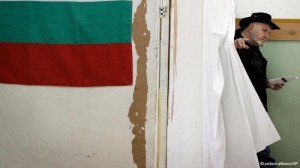Bulgaria’s 2016 Presidential Election and Referendum Go to Runoff Ballot
Some 6.8 million Bulgarians are eligible to choose their new president who will replace incumbent Rosen Plevneliev after his five-year term ends in January. The election campaign focused mainly on the future of the European Union, relations with Russia and the threats from a possible rise in migrant inflows from neighboring Turkey
For the first time, voting in the presidential elections will be compulsory.
A tight race as expected between the two frontrunners, Parliament Speaker Tsetska Tsacheva, nominated by main ruling party GERB, and former Air Force Commander Maj Gen Rumen Radev, endorsed by the main opposition force, the Bulgarian Socialist Party (BSP). Tsacheva, pointed by Prime Minister Boyko Borisov in October, is expected to win the first round by a narrow margin.
- Gallup International has projected a 26.7% support for Radev, while the candidate of the main ruling GERB party, Tsetska Tsacheva, has ranked second, having mastered 22.5%
- Alpha Research, another pollster offering exit poll results, suggests Radev has garnered 24.8%, with Tsacheva’s support at 23.5%.
- According to Alpha Research, third, lagging far behind, is nationalist candidate Krasimir Karakachanov, at 13.6%.
- Fourth, surprisingly, comes businessman Veselin Mareshki (9.3%) who runs as an independent candidate, followed by Reformist Bloc’s Traycho Traykov at 7.1%.
 Government Elections in Bulgaria (2005-2015)
Government Elections in Bulgaria (2005-2015)
2005 Parliamentary Elections
2006 Presidential Elections
2007 Municipal Elections
2009 Parliamentary Elections
2009 European Parliament elections
2011 Presidential Elections
2011 Local Elections
2013 Early parliamentary elections
2014 Early Parliamentary Elections
2015 Municipal Elections
25 Years after Communism…
25 years in 60 seconds at the red-light…
I’m driving slowly in the dark and raining streets of my home town passing through clouds of car smoke. The gypsy ghetto in the outskirts of town is covered with the fog of fires made out of old tires burning in the yards. And the loud music adds that grotesque and gothic nuance to the whole picture with poorly clothed children dancing around the burnings.
The first red light stops me at the entrance to the “more civilized” part of the city. The bright counter right next to it slowly moves through the long 60 seconds while tiredly walking people pass through the intersection to go home and escape the cold rain. The street ahead of me is already covered with dirt and thickening layer of sleet.
This is how I remember Bulgaria of my youth and it seems like nothing has changed in the past 25 years.
The newly elected government just announced its coalition cabinet – next to a dozen like it that had failed in the past two decades. The gas price is holding firmly at $6/gal. and the price of electricity just increased by 10%, while the harsh winter is already knocking at the doors of poor Bulgarian households. A major bank is in collapse threatening to take down the national banking system and create a new crisis much like in Greece. These are the same factors that caused Bulgaria’s major inflation in 1993 and then hyperinflation in 1996-97.
What’s next? Another winter and again a hard one!
Ex-secret police agents are in all three of the coalition parties forming the current government. The ultra nationalistic party called “ATTACK” and the Muslim ethnic minorities party DPS are out for now, but awaiting their move as opposition in the future parliament. At the same time, the new-old prime minister (now in his second term) is already calling for yet another early parliamentarian election in the summer. This is only months after the previous elections in October, 2014 and two years after the ones before them on May 2013.
Every Bulgarian government in the past 25 years has focused on two rather mechanical goals: cardinal socio-economical reforms and battle against communism. The latter is simply unachievable without deep reformative change within the Bulgarian post-communist mentality. The purpose of any reform should be to do exactly that. Instead, what is always changing is the outwardness of the country. The change is only mechanical, but never organic within the country’s heart.
Bulgaria’s mechanical reforms in the past quarter of a century have proven to be only conditional, but never improving the conditions of living. The wellbeing of the individual and the pursuit of happiness, thou much spoken about, are never reached for they never start with the desire to change within the person. For this reason, millions of Bulgarians and their children today work abroad, pursuing another life for another generation.
The stop light in front of me turns green bidding the question where to go next. Every Bulgarian today must make a choice! Or we’ll be still here at the red light in another 25 years from now…








Comments